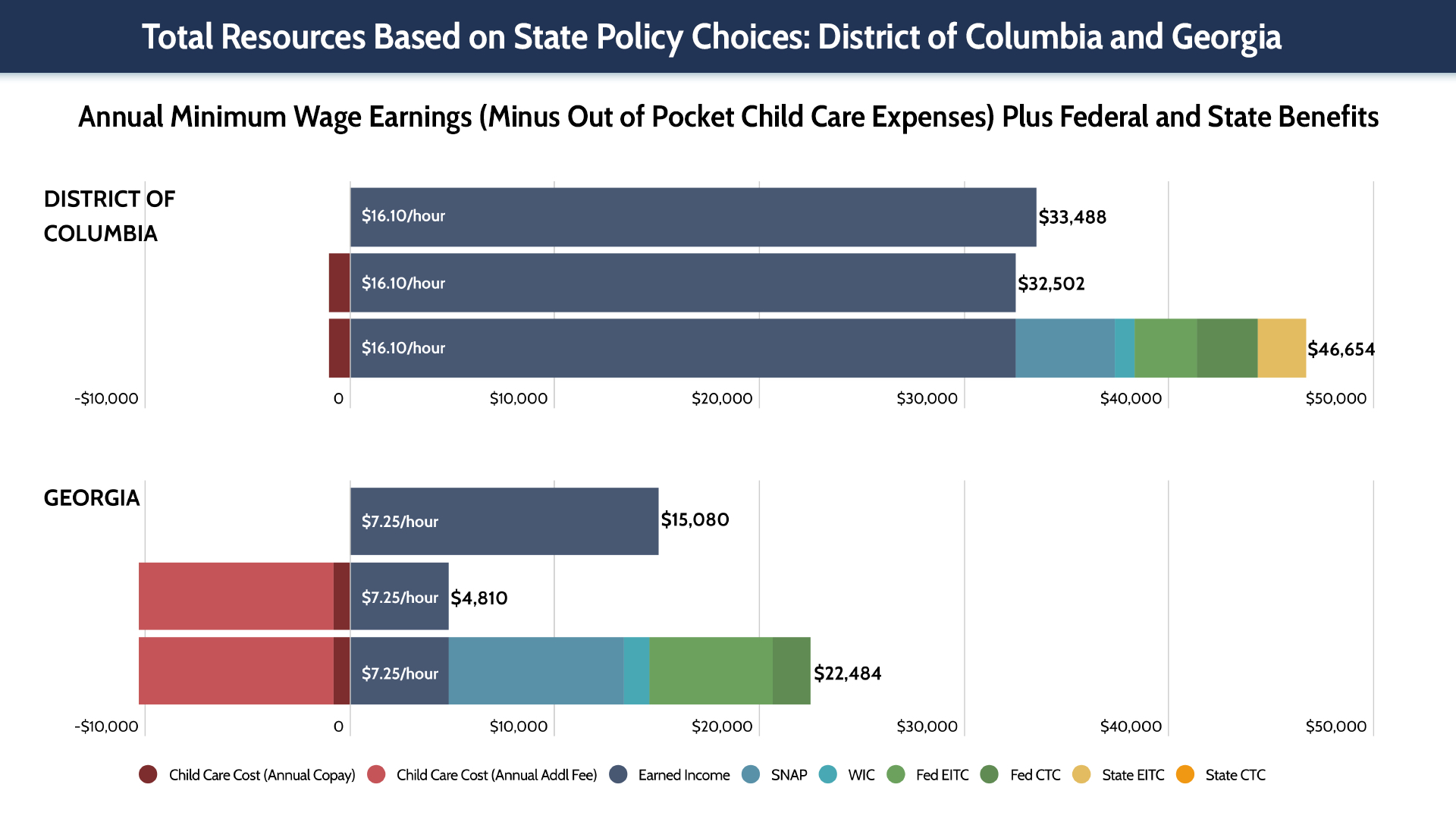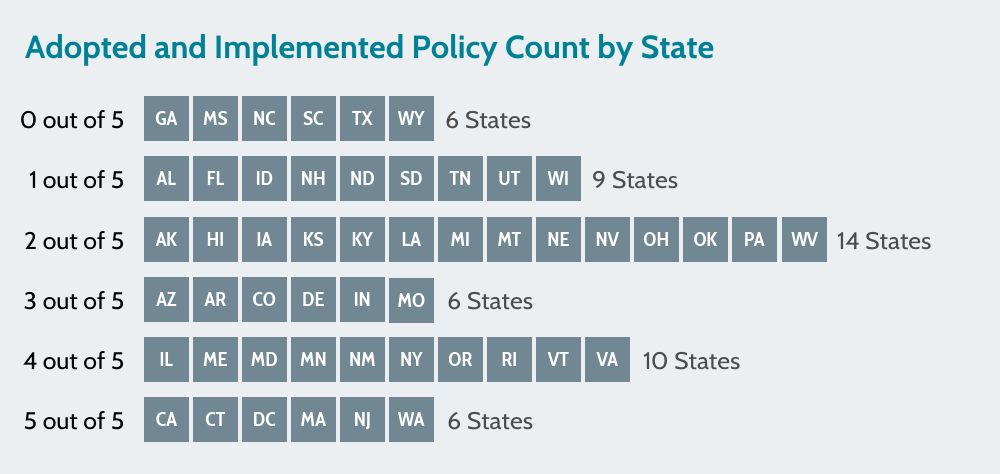Many Early Learning events are still happening virtually. We’ll continue covering them even as we wait impatiently to take our Early Learning Nation Studio back on the road. Stay tuned as ELN recaps Top Takeaways from important conversations, town halls, webinars and virtual events from the Early Learning field. And visit our Early Learning Nation channel on YouTube for interviews with leaders from education, child development, business, politics, science and more.
The state where you’re born has a huge impact on your health and well-being. Last month, the Prenatal-to-3 Policy Impact Center (PN-3) at Vanderbilt University hosted the 2022 Research to Policy Summit to mark the publication of its annual State Policy Roadmap.
“State leaders need to be prepared to do big things,” urged Executive Director and Founder Cynthia Osborne, Ph.D. The PN-3 team compared the progress of the 50 states and the District of Columbia on five policies that the evidence says are most effective at creating the conditions in which young children thrive, along with six strategies that help them get there.
States have different priorities and political contexts, and according to PN-3, “the level of resources a family has available to meet their basic needs varies substantially, from nearly $47,000 per year in the District of Columbia, to less than $23,000 in Georgia.”
“Federal dollars are needed to level those differences out,” Capita’s Elliot Haspel stated. As American Rescue Plan funds filter through the states and then dry up, sustainable revenue sources are needed. “Politicians aren’t taking it seriously enough,” Haspel said.
👉 2022 Roadmap Simulation: Same Family, Different Resources
Here are our 5 Top Takeaways:
1. Five states are five-for-five. Connecticut and Washington State joined California, Massachusetts, New Jersey and D.C. in implementing all five policies deemed most effective:
- Expanded Income Eligibility for Health Insurance. No new states adopted and fully implemented Medicaid expansion this past year, but 11 of the 12 remaining non-expansion states introduced legislation to do so.
- Reduced Administrative Burden for Supplemental Nutrition Assistance Program (SNAP). Participation in SNAP among those eligible has risen in recent years but still varies considerably by state.
- Paid Family Leave. Only 56% of workers qualify for the federal Family and Medical Leave Act, and the policy largely benefits higher-income and white workers.
- State Minimum Wage. Currently, 31 states have a minimum wage that is higher than the $7.75 federal level, with D.C., California and some cities already at or above $15.
- State Earned Income Tax Credit (EITC). According to a 2020 study, this is the most effective anti-poverty policy for children, compared to SNAP, Temporary Assistance for Needy Families (TANF) and state child tax credits. Currently, 21 states have a refundable state EITC of at least 10% of the federal credit.
2. PN-3 identified six strategies that states are using to boost equity:
- Comprehensive screening and connection programs. Specifically, the report mentions Developmental Understanding and Legal Collaboration for Everyone (DULCE; an initiative of the Center for the Study of Social Policy), Family Connects and HealthySteps (a ZERO TO THREE initiative)
- Child Care Subsidies, which, according to PN-3, “may allow more parents to work or complete education and training programs, and may support healthy child development when care settings are high quality and stimulate children’s early brain development.”
- Group prenatal care, exemplified by CenteringPregnancy, a program running at approximately 350 sites across more than 40 states.
- Evidence-based home visiting programs, including traditional and virtual models, which proliferated during the pandemic.
- Early Head Start, which can be based in a center or the home, providing nurturing and responsive relationships and improving the physical and mental health of parents.
- Early intervention services for infants and toddlers with disabilities or developmental delays.
3. The pandemic changed everything. Businesses, governments and families are all still managing the fallout from Covid-19. The child care sector, in all its various forms, is undergoing a workforce crisis that hits low-income families especially hard. Haspel noted that the price of child care is rising “faster than inflation, even in this inflationary era” and called for “permanent, dedicated and significant funding.” Hawaii state senator Joy San Buenaventura, noted that the unemployment rate there skyrocketed when tourism cratered. She has advocated for Medicaid expansion and a refundable, permanent state EITC as well as a Child Wellness Bill that would provide incentives for checkups. “Covid changed work,” said Antonio Hayes, State Senator, Maryland General Assembly, who shared that becoming a father reconfirmed his commitment to paid leave.
4. Change doesn’t happen overnight. The panelists described the process by which legislation is proposed and debated in the states. Once it finally passes, implementation can take years. Bipartisanship can accelerate change. Jim Burgin, State Senator, North Carolina General Assembly, belongs to the Republican Party. “Every child,” he said, “should have the opportunity for a healthy birth and a great life.” He mentioned Medicaid expansion as a policy solution he supported, stipulating, “Medicaid should be robust but temporary.”
5. Business leaders should wield their influence. ReadyNation member Bridgette Roman quoted Nelson Mandela: “Our children are our greatest treasure. They are our future. Those who abuse them tear at the fabric of our society and weaken our nation.” Rhonda Fields State Senator, Colorado State Legislature, concurred that the business community has an important role to play on children’s issues. Barbara Reich Freiberg, State Representative, Louisiana House of Representatives, credited Louisiana Association of Business and Industry for its advocacy.
👉 Check out the Prenatal-to-3 State Policy Clearinghouse for comprehensive summaries of the research

Mark Swartz
Mark Swartz writes about efforts to improve early care and education as well as developments in the U.S. care economy. He lives in Maryland.





